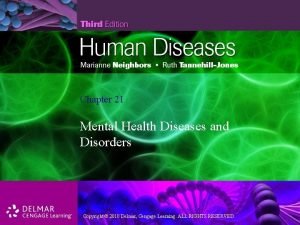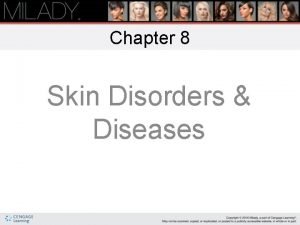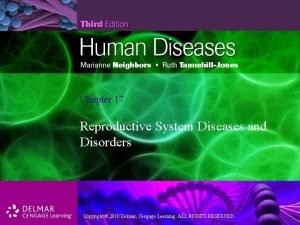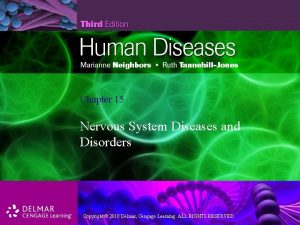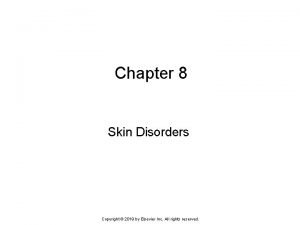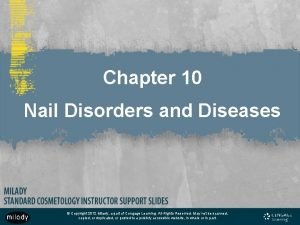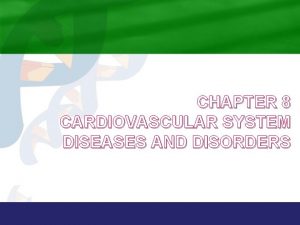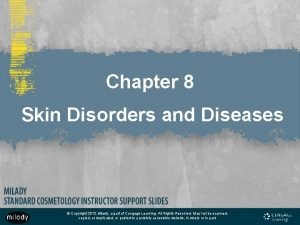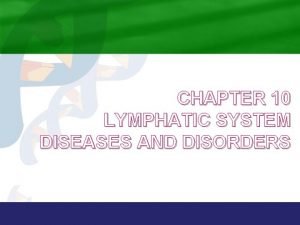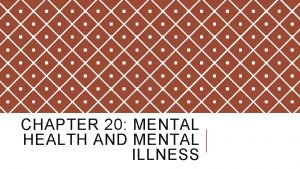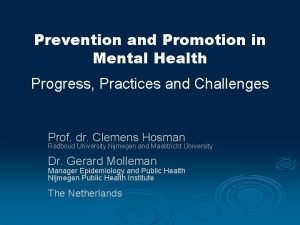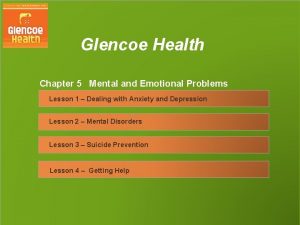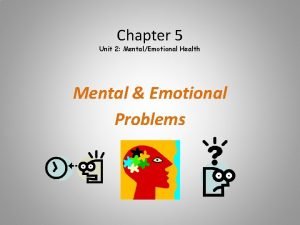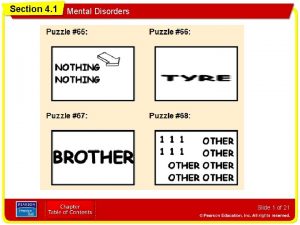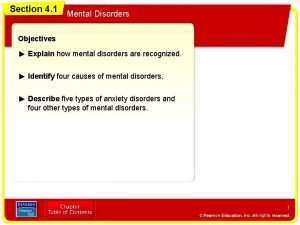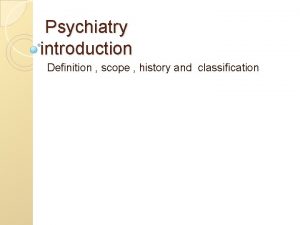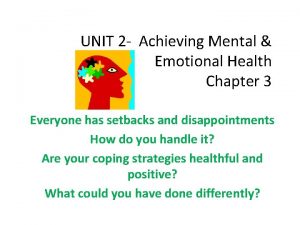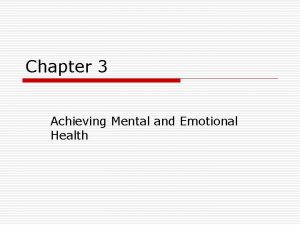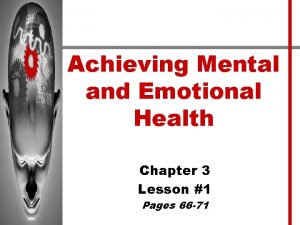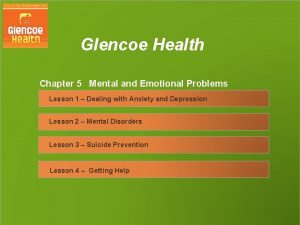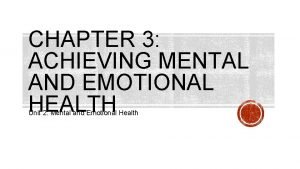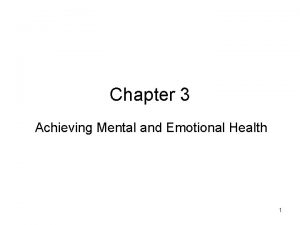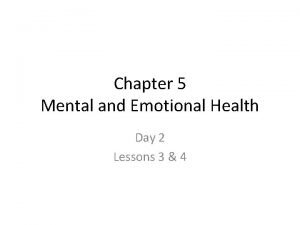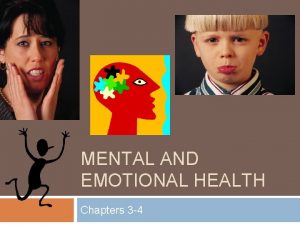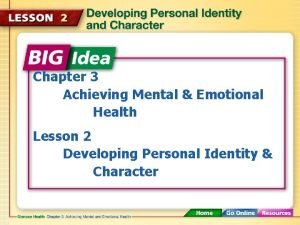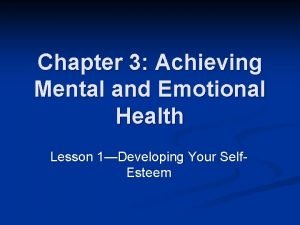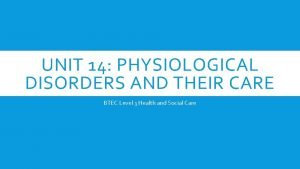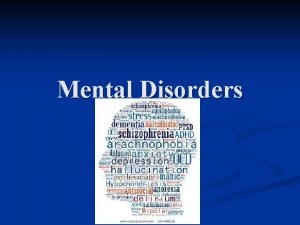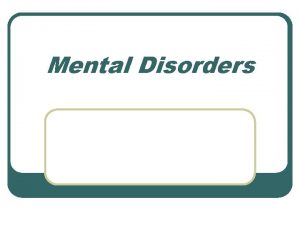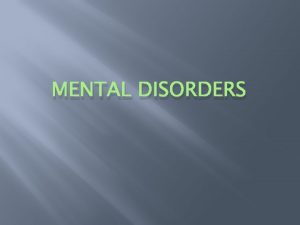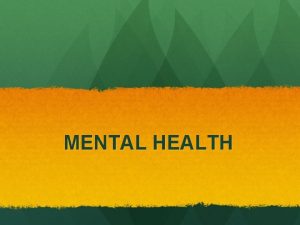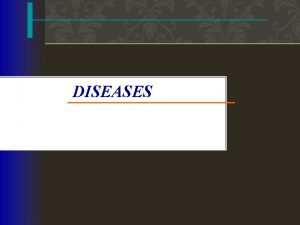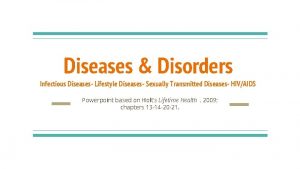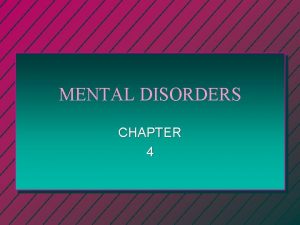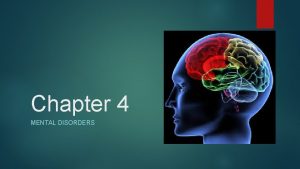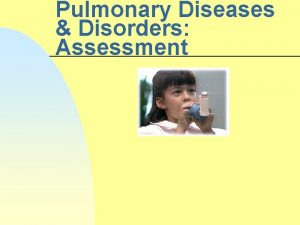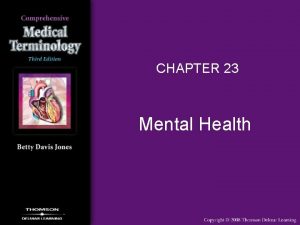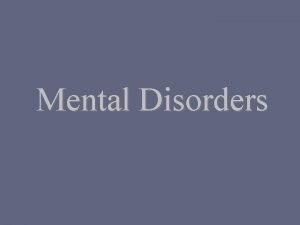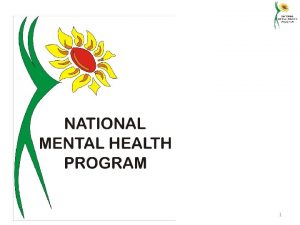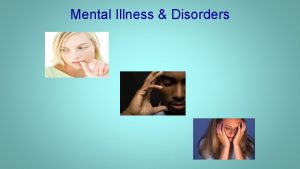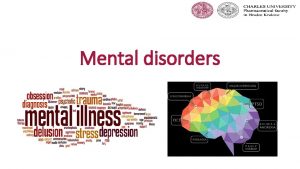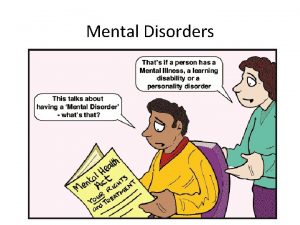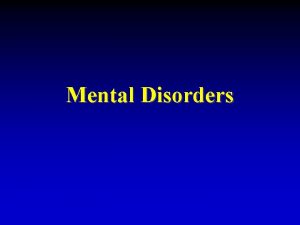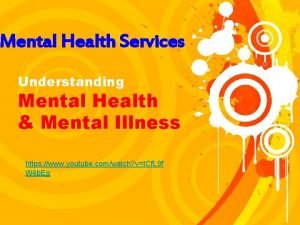Chapter 21 Mental Health Diseases and Disorders Copyright

































- Slides: 33

Chapter 21 Mental Health Diseases and Disorders Copyright © 2010 Delmar, Cengage Learning. ALLALL RIGHTS RESERVED.

Common Signs and Symptoms • Typically begin with behavioral changes • Slow-developing and very subtle • May not be noticed early in development of disorder • Forgetfulness, anxiety, and temper tantrums Copyright © 2010 Delmar, Cengage Learning. ALL RIGHTS RESERVED.

Diagnostic Tests • Physiologic tests – Brain scans, EEGs, and MRIs • Referral to psychiatrist for psychological testing – Aptitude and personality tests Copyright © 2010 Delmar, Cengage Learning. ALL RIGHTS RESERVED.

Developmental Mental Health Disorders • Intellectual disability – Formerly known as mental retardation – Symptoms: • Decreased intelligence • Decreased ability to learn, socialize, and mature – Known causes: • Genetic • Acquired Copyright © 2010 Delmar, Cengage Learning. ALL RIGHTS RESERVED.

Developmental Mental Health Disorders • Attention deficit hyperactivity disorder – Symptoms: • Inability to concentrate • Hyperactivity • Impulsiveness – Cause unknown, but seems familial – Treatment: • Amphetamines Copyright © 2010 Delmar, Cengage Learning. ALL RIGHTS RESERVED.

Developmental Mental Health Disorders • Eating disorders – Compulsion to eat or avoid eating that affects individual’s mental and physical condition – Most common: • Anorexia nervosa • Bulimia Copyright © 2010 Delmar, Cengage Learning. ALL RIGHTS RESERVED.

Developmental Mental Health Disorders • Tic disorders – Sudden, rapid muscle movement or vocalization • E. g. , eye blinking, facial grimacing, neck or shoulder jerking, throat clearing, snorting, grunting • Enuresis – Bedwetting – Urinary incontinence after toilet training Copyright © 2010 Delmar, Cengage Learning. ALL RIGHTS RESERVED.

Substance-Related Mental Disorders • Diagnosis used – Instead of drug addiction • Common terms: – – Addiction Dependency Tolerance Withdrawal Copyright © 2010 Delmar, Cengage Learning. ALL RIGHTS RESERVED.

Substance-Related Mental Disorders • Alcohol – Alcoholism • Physical and mental dependence on alcohol – Chronic – Progressive – Often fatal Copyright © 2010 Delmar, Cengage Learning. ALL RIGHTS RESERVED.

Substance-Related Mental Disorders • Marijuana – Also known as pot – Euphoric effect • Cocaine – Accelerant to CNS and anesthetic Copyright © 2010 Delmar, Cengage Learning. ALL RIGHTS RESERVED.

Substance-Related Mental Disorders • Methamphetamine – Fastest growing abused drug today – Addictive potent CNS stimulant • Caffeine and nicotine – Most common addictive substances • Sedatives or depressants – Anti-anxiety medications Copyright © 2010 Delmar, Cengage Learning. ALL RIGHTS RESERVED.

Substance-Related Mental Disorders • Amphetamines – Release epinephrine leading to increased heart rate, respiration, and digestion • Hallucinogens – Also known as psychedelic drugs – E. g. , lysergic acid diethylamide (LSD), mescaline, phencyclidine (PCP) Copyright © 2010 Delmar, Cengage Learning. ALL RIGHTS RESERVED.

Substance-Related Mental Disorders • Narcotics – Depressants primarily prescribed as analgesics – E. g. , heroin, opium • Inhalants – Abused legal substances – Taken by huffing, snuffing, and bagging – E. g. , glue, nail polish, lighter fluid Copyright © 2010 Delmar, Cengage Learning. ALL RIGHTS RESERVED.

Substance-Related Mental Disorders • Anabolic steroids – Abused by athletes to produce increases in muscle strength, lean body mass, and improved performance – Dangerous long-term effects Copyright © 2010 Delmar, Cengage Learning. ALL RIGHTS RESERVED.

Organic Mental Disorders • Associated with physical cause • Affect cognition and ability to think, remember, and make judgments • May be temporary or permanent Copyright © 2010 Delmar, Cengage Learning. ALL RIGHTS RESERVED.

Organic Mental Disorders • Dementia – Deterioration of mental abilities due to physical changes in brain • Delirium – Acute condition from medications, alcohol, fever, or illness • Alzheimer’s disease – Progressive, irreversible form of dementia Copyright © 2010 Delmar, Cengage Learning. ALL RIGHTS RESERVED.

Psychosis • • Disintegration of one’s personality Impaired communication skills Inability to deal with life’s demands Delusions and hallucinations Copyright © 2010 Delmar, Cengage Learning. ALL RIGHTS RESERVED.

Psychosis • Schizophrenia – Loss of touch with reality – Delusions • Delusional disorders – Belief in delusion in otherwise normally adjusted and balanced personality – Treatment: • Antipsychotic medications Copyright © 2010 Delmar, Cengage Learning. ALL RIGHTS RESERVED.

Psychosis • Delusional disorders – Types: • • • Grandiose Jealous Erotomanic Persecutory Somatic Copyright © 2010 Delmar, Cengage Learning. ALL RIGHTS RESERVED.

Mood or Affective Disorders • Depression – Prolonged feeling of extreme sadness, unhappiness, despair, or discouragement • Seasonal affective disorder – Depressive condition during winter months Copyright © 2010 Delmar, Cengage Learning. ALL RIGHTS RESERVED.

Mood or Affective Disorders • Bipolar disorder (manic depressive) – Extreme depression and mania occur – Mood disorder questionnaire (MDQ) aids physician in identifying symptoms Copyright © 2010 Delmar, Cengage Learning. ALL RIGHTS RESERVED.

Dissociative Disorders • Changes in identity or consciousness • Types: – – Psychogenic amnesia Psychogenic fugue Depersonalization Multiple personality Copyright © 2010 Delmar, Cengage Learning. ALL RIGHTS RESERVED.

Anxiety Disorders • Anxiety – Usual temporary response to stress becomes chronic • May be related to genetic factors, severe stress, biochemical alterations, and in some cases, physical causes – E. g. , hyperthyroidism Copyright © 2010 Delmar, Cengage Learning. ALL RIGHTS RESERVED.

Anxiety Disorders • Types: – – – Generalized anxiety disorder Panic disorder Phobia disorder Obsessive-compulsive disorder Post-traumatic stress disorder Copyright © 2010 Delmar, Cengage Learning. ALL RIGHTS RESERVED.

Somatoform Disorders • Physical symptoms, but no organic cause found • Conversion – Hysterical neurosis • Hypochondriasis – Abnormal anxiety about one’s body and health Copyright © 2010 Delmar, Cengage Learning. ALL RIGHTS RESERVED.

Somatoform Disorders • Pain disorder – Pain does not have physiologic cause • Malingering – False display of symptoms for financial or personal reward • Munchausen syndrome – Simulation of illness for no other reason than to receive treatment Copyright © 2010 Delmar, Cengage Learning. ALL RIGHTS RESERVED.

Personality Disorders • Types: – – – Paranoid Schizoid Antisocial Narcissistic Histrionic Copyright © 2010 Delmar, Cengage Learning. ALL RIGHTS RESERVED.

Gender Identity Disorder • Individual uncomfortable or distressed with sexual identity • Adults may seek hormonal or surgical intervention for sex change Copyright © 2010 Delmar, Cengage Learning. ALL RIGHTS RESERVED.

Sexual Disorders • Types: – – Exhibitionism Fetishism Transvestic fetishism Frotteurism Copyright © 2010 Delmar, Cengage Learning. ALL RIGHTS RESERVED.

Sexual Disorders • Types: – – Pedophilia Sexual sadism Sexual masochism Voyeurism Copyright © 2010 Delmar, Cengage Learning. ALL RIGHTS RESERVED.

Sleep Disorders • Types: – – – Insomnia Narcolepsy Sleep apnea Nightmare disorder Sleep terror Sleepwalking Copyright © 2010 Delmar, Cengage Learning. ALL RIGHTS RESERVED.

Trauma • Grief – Natural process of coping with loss • Suicide – Major concern with teenagers Copyright © 2010 Delmar, Cengage Learning. ALL RIGHTS RESERVED.

The Older Adult • Disorders may occur in early childhood or later in life • Important to distinguish if actual mental health problem or physiologic or system-specific disorder • Some symptoms due to aging process or side effects of medications Copyright © 2010 Delmar, Cengage Learning. ALL RIGHTS RESERVED.
 Chapter 21 mental health diseases and disorders
Chapter 21 mental health diseases and disorders Chapter 8 skin disorders and diseases review questions
Chapter 8 skin disorders and diseases review questions Chapter 6 musculoskeletal system
Chapter 6 musculoskeletal system Chapter 17 reproductive system diseases and disorders
Chapter 17 reproductive system diseases and disorders Chapter 15 nervous system diseases and disorders
Chapter 15 nervous system diseases and disorders Elsevier
Elsevier Describe how to conduct nail and skin analysis
Describe how to conduct nail and skin analysis Milady chapter 10 nail disorders and diseases
Milady chapter 10 nail disorders and diseases Chapter 8 cardiovascular system
Chapter 8 cardiovascular system Milady chapter 8 skin disorders and diseases
Milady chapter 8 skin disorders and diseases Chapter 10 lymphatic system diseases and disorders
Chapter 10 lymphatic system diseases and disorders Mental health and mental illness chapter 20
Mental health and mental illness chapter 20 Mental health disorders
Mental health disorders Glencoe health chapter 9
Glencoe health chapter 9 Chapter 5 mental and emotional problems answer key
Chapter 5 mental and emotional problems answer key Mental illness mental health jeopardy
Mental illness mental health jeopardy Section 4-1 mental disorders answers
Section 4-1 mental disorders answers Section 4-1 mental disorders answers
Section 4-1 mental disorders answers Classification of mental disorders
Classification of mental disorders Chapter 3 lesson 3 expressing emotions in healthful ways
Chapter 3 lesson 3 expressing emotions in healthful ways Chapter 3 achieving mental and emotional health
Chapter 3 achieving mental and emotional health Glencoe health chapter 3 lesson 1 answers
Glencoe health chapter 3 lesson 1 answers Chapter 5 lesson 3 suicide prevention answer key
Chapter 5 lesson 3 suicide prevention answer key Chapter 15 achieving mental and emotional health answer key
Chapter 15 achieving mental and emotional health answer key Chapter 3 achieving mental and emotional health
Chapter 3 achieving mental and emotional health Emotional health defintion
Emotional health defintion Achieving mental and emotional health
Achieving mental and emotional health Chapter 3 mental and emotional health
Chapter 3 mental and emotional health Chapter 3 achieving mental and emotional health
Chapter 3 achieving mental and emotional health Chapter 3 achieving mental and emotional health
Chapter 3 achieving mental and emotional health Chapter 3 lesson 2 health
Chapter 3 lesson 2 health Chapter 3 achieving mental and emotional health
Chapter 3 achieving mental and emotional health Chapter 15 achieving mental and emotional health
Chapter 15 achieving mental and emotional health Health and social care unit 14 coursework
Health and social care unit 14 coursework
